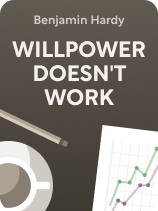

This article is an excerpt from the Shortform book guide to "Willpower Doesn't Work" by Benjamin Hardy. Shortform has the world's best summaries and analyses of books you should be reading.
Like this article? Sign up for a free trial here.
Are you struggling to achieve your goals despite your best efforts? If the secret to your success doesn’t lie in your willpower, where does it lie?
Benjamin Hardy, psychologist and best-selling author, challenges the notion that willpower alone can lead to success. In Willpower Doesn’t Work: Discover the Hidden Keys to Success, he proposes a different approach: designing your life to make achieving your goals inevitable.
Continue reading for an overview of this practical book.
Overview of Willpower Doesn’t Work
Modern society teaches us that we can accomplish anything through willpower and discipline—but what if that’s the wrong approach? In Willpower Doesn’t Work: Discover the Hidden Keys to Success, psychologist Benjamin Hardy says that willpower is nowhere near as strong as people think, and that’s why we can’t just “will” our way to success. Instead, we need to carefully design our lives in ways that make reaching our goals inevitable, minimizing the need for willpower.
Hardy is best known as the author of several best-selling self-help books, including Willpower Doesn’t Work and Personality Isn’t Permanent. He’s also, along with entrepreneurial coach Dan Sullivan, the co-author of such popular productivity books as The Gap and the Gain and Who Not How. In addition, Hardy works as a productivity coach for both companies and individuals and is a blogger for Medium, where he writes about how to take control of your life and achieve your dreams. Hardy holds a PhD in Organizational Psychology from Clemson University.
Our overview to Willpower Doesn’t Work will begin with a high-level overview of why determination and discipline aren’t enough to achieve your goals, then outline Hardy’s proposed solution of designing your personal environment with success in mind. From there, we’ll discuss three of Hardy’s suggestions in detail:
- Optimizing your working and resting environments to ensure that you accomplish your goals
- Eliminating temptations that distract you and drain your willpower
- Optimizing your “mental environment” by adjusting your thought patterns and habits
The Problem: Willpower Is Weaker Than You Think
Hardy begins by explaining that many people think of willpower like a muscle: the more you use it, the stronger it gets. Therefore, they believe that the way to accomplish anything—from landing your dream job, to losing weight, to overcoming addiction—is to work hard and keep training your discipline. Also, the main reason people give for falling short of their goals is a lack of willpower.
However, Hardy says that willpower is actually a very weak “muscle”; no matter how hard you work, there’s only so much it can do. Furthermore, modern life all but ensures that your willpower is permanently exhausted. Every day, starting from the moment you wake up, you’re bombarded with decisions: what to wear, what to eat, what to watch or listen to while you get ready, and so on. You’re also constantly fighting against countless temptations, such as time-wasting social media feeds and smartphone games, junk food, and alcohol and other drugs, just to name a few.
In short, trying to create the life you want through pure willpower is almost sure to fail, and that’s not your fault.
The Solution: Design Environments That Force You to Succeed
If you can’t rely on willpower, how do you achieve your goals?
Hardy says the key is to create an environment that forces you to become the person you want to be. This is a better approach because, while humans aren’t as strong-willed as we like to think, we are excellent at adapting to our environments. We’re also uniquely good at changing our environments; adapting our surroundings to meet our needs. Therefore, Hardy says that you can accomplish anything by using these two natural strengths in tandem.
In short, you can intentionally adapt your environment in ways that, in turn, force you to adapt. To give a simple example, you could try leaving your cell phone charger at work. This tactic would strictly limit how much time you spend on your phone at home, with no willpower needed on your part; your phone’s battery would set a hard limit on how much you can use it.
Create a Work Environment and a Rest Environment
Hardy adds that it’s actually best to create two different environments for yourself: one for working and one for resting. This is important because you’ll struggle to be productive in a place that you associate with rest and relaxation, such as your bedroom or living room. Entering those places cues your brain that it’s time to relax and unwind, and forcing yourself to be productive under those circumstances takes a lot of willpower.
The reverse is also true, meaning you won’t rest as effectively in a place that you associate with work and stress. For that reason, Hardy doesn’t suggest working from home: The mismatch between your environment (a place you use for work) and your goal (to stop thinking about work so you can rest) will distract you, so you won’t be able to fully enjoy your rest time.
Tip #1: Force Yourself Toward Your Goals
Hardy says that, ideally, your environment will force you toward your goals without the need for willpower and discipline. In a well-designed environment, you’ll accomplish your goals simply because you don’t have any other choice. Hardy says that you can do this using self-imposed restrictions called forcing functions.
We’ll discuss how you can design your working and resting environments to force you to act in line with your goals, minimizing the need for willpower.
Force Yourself Toward Your Work Goals
Hardy says that, as you design your working environment, your first priority should be to create eustress. Eustress is healthy, manageable stress that keeps you focused and energized (as opposed to distress, which is distracting and tiring). You could also think of eustress as pressure or motivation; whichever term you prefer, it’s an external force that pushes you to do your best work.
Note that “work” in this context doesn’t just mean your job. Instead, Hardy suggests keeping eustress front-of-mind for anything that takes effort, such as fitness goals and creative projects.
Three Ways to Create Eustress
Hardy’s tips for creating eustress fall into three categories.
1. Challenging yourself. One of the most effective ways to create eustress is to set difficult goals because you’ll be motivated to work harder to reach those goals. This often means that the goal itself is ambitious, like doubling your income by the end of next year. However, it could also mean setting a goal that’s difficult for you personally, such as overcoming an injury or giving your house a top-to-bottom cleaning (if cleaning is something you struggle with).
2. Trying new things. New experiences are powerful motivators. This is because when you’re trying something for the first time, you’re forced to focus completely and work much harder than usual to make sure you’re doing it correctly. This principle also applies to learning new information: You have to stay engaged in order to understand and retain what you’ve learned. Therefore, whenever it’s feasible, take opportunities to experience new things—for example, you might take on a new responsibility at work, or find a podcast that teaches you about a topic you’re interested in. Note that this category of eustress will have some overlap with the first category (challenge) because it’s often difficult to do something you’ve never done before.
3. Creating consequences for failure. Challenging goals can be motivational, but they can also be disheartening. Therefore, to keep yourself on track, make sure that there will be consequences for you if you fall short. One way to do this is by investing your own resources into a project, meaning that you’ll suffer a loss if the project fails—for example, if you sign up for guitar lessons and then don’t go to them, you’ll have wasted your money. Another approach is to create social consequences by publicly announcing your goals to your friends and family, or anyone whose opinion you value. Since you won’t want to disappoint those people or be publicly embarrassed by failing at what you promised to do, you’ll work harder to reach your goals.
Force Yourself Toward Your Rest Goals
It might seem strange to set goals for your resting time, but remember that rest itself is the goal. Therefore, Hardy urges you to design every aspect of your resting environment with that goal in mind.
Whereas your work environment puts you under as much (healthy) stress as possible, your rest environment is a place where you’re protected from any stress. This should be a place where you can sleep, enjoy your hobbies, spend time with loved ones, and do whatever else makes you feel rested and refreshed—all without needing to worry about people putting demands on your time and energy.
First, Hardy says that you should decorate your environment in ways that help you to rest. For instance, choose colors and artworks that make you feel relaxed, uplifted, or joyful. Fill the space with things that make you happy such as books or collectibles, and get furniture that keeps you comfortable.
Second, writes Hardy, note that your rest environment isn’t just the physical space you rest in: It also includes the activities you do and the people you do them with. Therefore, joining social groups such as a book club or a fantasy football league can help keep you on track for your resting goals. Doing so will ensure that you regularly spend time with people who have similar interests and, in many cases, you’ll have a fixed schedule that forces you to do things you enjoy.
Rest Is as Important as Work
Effective rest is, naturally, crucial for recovering after working your hardest. However, Hardy adds that resting is also when your skills and abilities improve. The cycle of work and rest functions just like exercise does for your muscles: You go to the gym to break down your muscles, then they become stronger when they repair themselves. However, without a rest period, that process doesn’t work; if you kept working the same muscles every day they’d have no chance to repair themselves, so you’d never get stronger (and you’d probably injure yourself).
In addition, you’re more likely to have original ideas and creative insights while resting. This is because rest frees your mind to wander, so you can make connections between thoughts that you’ve never made before. Conversely, while you’re focused on work you’re only thinking about how to accomplish the task in front of you, which doesn’t give you much opportunity for creativity.
Finally, Hardy warns that most people simply don’t spend enough time resting, no matter how well they design their environments. He says that you should spend at least as much time resting as you spend working, and preferably more than that.
Occasionally Try a New Environment
Hardy also says that, no matter how well you’ve designed your resting environment, sometimes the most effective way to boost your motivation and creativity is to find an entirely new environment. By doing so, you can have what he calls peak experiences: rare, thrilling moments when you’re suddenly filled with energy and ideas.
The author adds that most people will have a few such moments in their lives simply by chance. However, you can experience them much more often if you deliberately seek them out. Furthermore, the strategy for doing so is fairly simple.
First, detach yourself from any outside stressors just as if you were going to your resting environment. Then, take a notebook and a pen and go someplace that’s not familiar to you. This doesn’t have to be anywhere distant or exotic; just a few miles from your home will do, as long as it’s a place you haven’t been before.
Hardy says that, once you’re there, take out your notebook and write down everything and everyone you’re grateful for in your life. This will help you to connect with what matters to you, and that connection will give you a powerful emotional boost.
Next, write down your current goals, both professional and personal. Are you hitting your targets or falling behind? What do you need to do to reach your goals? What changes do you need to make? What difficulties and frustrations are getting in your way? The purpose of this exercise is to clear your mind and refocus on your goals, so it’s crucial to be brutally honest with yourself—remember, nobody else will ever read this journal, so there’s no need to be embarrassed.
Finally, map out your grand dreams. What are your most ambitious hopes for the next few months, or the next year? What is your ultimate life objective? The goal here is to reconnect with your core values and pinpoint the fundamental thing that motivates your actions. In other words, the goals you’ve set are your “what”; this last step is about finding your “why.” For instance, if one of your goals is to become a teacher, you might realize it’s because, at heart, you’re driven by a desire to help others or to make the world better for future generations.
Tip #2: Remove Temptations
While Hardy’s first tip was to identify ways to push yourself toward your goals, his second tip is to remove anything that doesn’t get you closer to your goals. This is important because, by doing so, you’ll eliminate temptations that drain your limited reserves of willpower. Therefore, Hardy says you should identify what in your environment is helping you, and ruthlessly get rid of everything else.
We’ll discuss how to minimize the technological temptations in your life, how to minimize the temptations that come from other people, and (briefly) how to minimize the various other temptations you regularly face.
Remove Technological Temptations
One of the biggest temptations in your life is probably technology, particularly your phone. While you’re trying to work, your phone is a source of constant, endless temptations ranging from social media to videos and games. And while you’re trying to rest, it’s a source of stress because it allows people to contact you and make demands on your time and energy.
Hardy says you can eliminate many of these temptations by identifying which phone apps really help you to either work or relax and deleting everything else. Then do the same with your computer.
Remove Human Temptations
Aside from technology, Hardy says that the biggest thing holding you back is probably relationships with the wrong kinds of people: friends and family members who tempt you away from what you want to achieve.
Therefore, it’s crucial to stop spending so much time and energy on people who don’t support you. This includes anyone who insults and belittles you, encourages you to do things that aren’t in line with your goals, or puts excessive demands on you. You can hopefully accomplish this just by having some frank conversations and setting clear boundaries with those people. However, if they refuse to respect your boundaries, your best option is to remove them from your life.
To illustrate this point with an extreme example, a recovering alcoholic is in great danger of being tempted away from their goal of sobriety by friends who still drink. If those friends won’t respect the person’s choice to give up alcohol, the only solution is for the person in recovery to cut off contact, thereby eliminating that temptation.
The author acknowledges that managing your relationships like this is difficult; it requires willpower. However, in the long run it requires a lot less willpower than you’d spend resisting people’s temptations.
Remove Other Temptations
Hardy says that technology and people are two of the biggest temptations in most people’s lives, as well as the hardest to eliminate. However, you’re almost certainly weighing yourself down with other, lesser temptations as well. Remember: Anything that’s not actively helping you is an unnecessary drain on your willpower.
Therefore, think carefully about anything else that might be cluttering up your life and tempting you away from your goals. Some common examples include junk food, recreational drugs, and old projects that you’ve been “meaning to get around to” for years.
Counterintuitively, you’ll probably also find that this process involves eliminating some of your goals. That’s because those goals interfere with more important ones. For example, if one of your goals is to host a weekly podcast, but doing so interferes with your goal of spending more time with your family, it’s most likely time to bring that podcast to an end.
Tip #3: Optimize Your Mental Environment
It’s important to optimize your mental “environment”—which is to say, your thoughts and habits.
Intentionally Redirect Your Thoughts
One way Hardy suggests optimizing your mental environment is by anticipating and counteracting thoughts that could make you fall short of your goals. In other words, expect yourself to fail, but use that expectation to put a plan in place so you can avoid that failure.
For example, suppose that your goal is to eat healthier, but you know you have a sweet tooth that could derail that goal. You might set the following plan: “The next time I’m craving sweets, I’ll eat an apple instead.” Hardy calls this an implementation intention.
Implementation intentions are essentially if-then statements, even when they’re not worded that way. So, the previous example could be rephrased as “If I have a sugar craving, then I will eat an apple.”
Break Bad Habits by Altering Them
Another way Hardy suggests optimizing your mental environment is to recognize and break the bad habits that are getting in the way of your goals. However, as always, he says you should do so in a way that minimizes the role of willpower.
Therefore, instead of trying to overcome bad habits through force of will, try to identify the triggers that prompt these habits. For instance, say you have a bad habit of staying up late playing video games. You might realize that seeing a particular time on the clock prompts you to start playing, with the assumption that you’ll play for a half hour and get to bed at an appropriate time—but then you play for an hour or more, go to bed late, and wake up tired the next day. You might break that pattern by getting rid of the clock so you never get that prompt to start playing. Another option would be to move the clock forward by an hour so you start playing sooner and still get to bed by the time you intended.
Hardy also proposes modifying how you carry out your habits. The goal in this case is not to stop the habit all at once, but rather to disrupt your behavioral patterns. Your mind will take a moment to adjust to the change, giving you a chance to question whether you really want to do what you’re about to do. For example, if you’re trying to stop smoking, you could simply change which hand you use to hold your cigarette or vape. Even that small disruption to your pattern will force you to pause and think about what you’re doing, which gives you a chance to not do it.

———End of Preview———
Like what you just read? Read the rest of the world's best book summary and analysis of Benjamin Hardy's "Willpower Doesn't Work" at Shortform.
Here's what you'll find in our full Willpower Doesn't Work summary:
- Why you can’t just “will” your way to success
- Practical ways to optimize your working and resting environments
- How you can make reaching your goals inevitable






